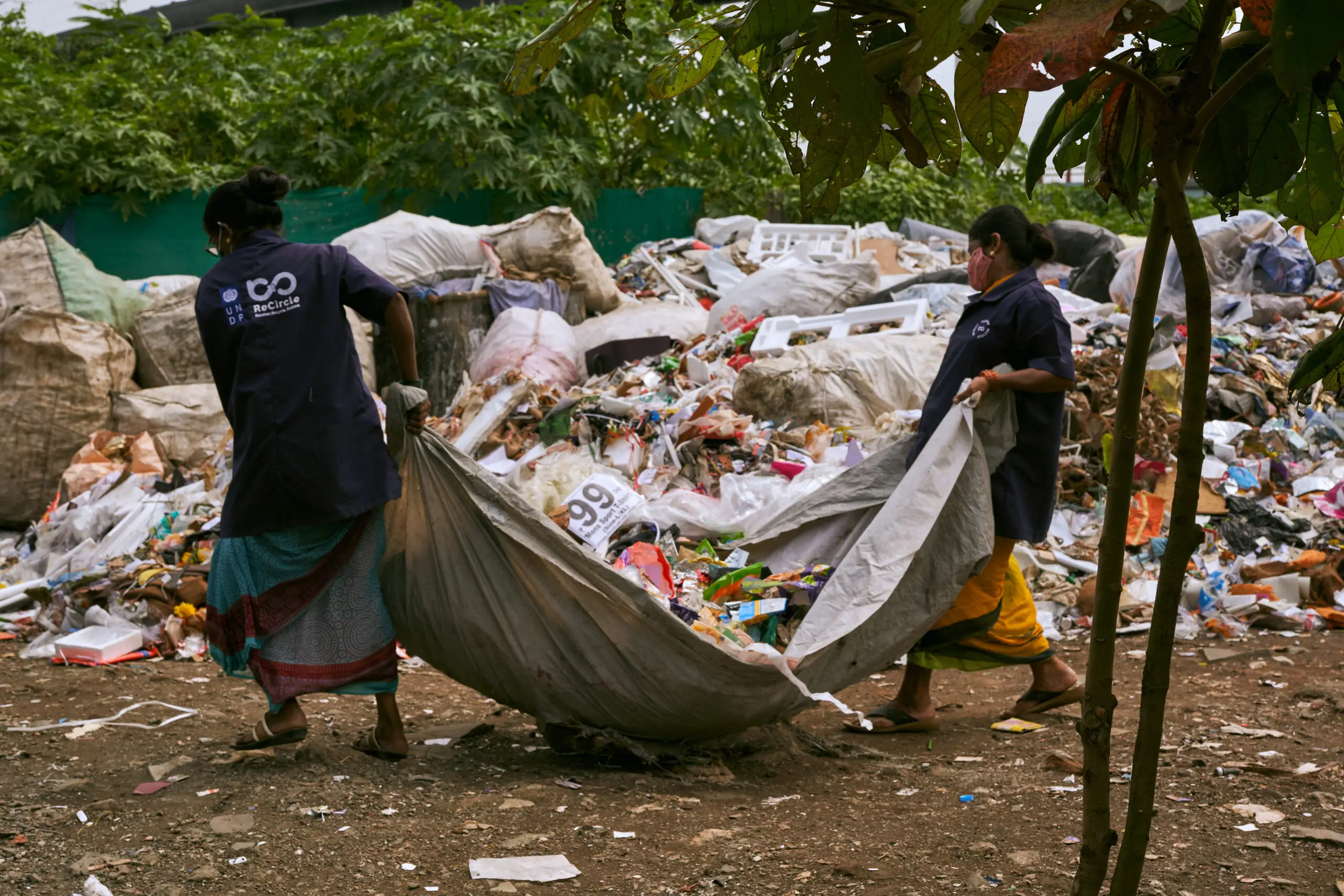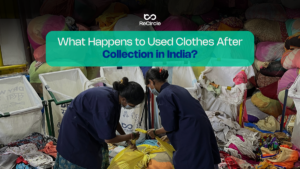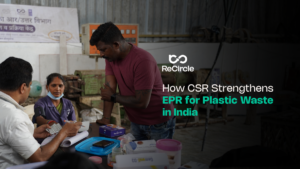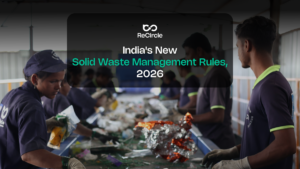India roughly generates around 9.3 million tonnes of plastic waste every year.
Without effective plastic recycling systems in place, much of this waste ends up in landfills, oceans, and informal dump sites, triggering long-term consequences for the environment, economy, and public health.
Without effective plastic recycling systems in place, much of this waste ends up in landfills, oceans, and informal dump sites, triggering long-term consequences for the environment, economy, and public health.
This article explores the environmental impact of not recycling plastic in India, highlights the current gaps in waste management and recycling infrastructure, and outlines what meaningful, scalable interventions could look like.
India’s Plastic Waste Landscape: A Snapshot
We might not be aware but plastic use in India has expanded very quickly over the past two decades. From packaging and textiles to electronics and construction, plastic is deeply embedded across industries. But, our waste management systems haven’t kept pace (Making the situation very hard to deal with).
Key facts:
- India generates 25,940 tonnes of plastic waste every day.
- Nearly 40% of this plastic waste remains uncollected or improperly managed.
- Only a fraction enters formal recycling systems with traceable outcomes.
Without proper recycling, this material turns into a persistent pollutant. Its lifecycle doesn’t end, it simply moves location.
Environmental Implications of Not Recycling Plastic
Landfills: Overflowing and Igniting
Unrecycled plastic contributes significantly to urban landfill volumes. Plastic doesn’t biodegrade. It accumulates, compresses, and becomes a fire risk.
- Dry waste fires, common in summer months, release hazardous gases like dioxins and furans into the atmosphere.
- These fires often burn for days and compromise air quality for kilometres.
Soil Contamination
Plastic debris, when broken down into microplastic fragments, infiltrates topsoil and farmland. Over time, it reduces soil aeration and fertility.
- Agricultural productivity declines in peri-urban areas near dump sites.
- Soil-bound plastic restricts water absorption and damages root systems.
Marine Plastic Leakage
A significant portion of mismanaged plastic reaches water bodies. It eventually flows into India’s rivers and coastal ecosystems.
- Plastics entangle marine species or are mistaken for food.
- Microplastics are now traceable in Indian seafood, drinking water, and even sea salt.
Impact on Livestock and Urban Wildlife
Street animals and cattle often ingest plastic while foraging in waste heaps.
- Veterinary studies have recovered 20 to 50 kg of plastic from cattle stomachs in urban India.
- This ingestion causes internal injuries, starvation, and premature death.
The Climate Link: Plastic and Carbon Emissions
Plastic is a petroleum-derived material. Its entire lifecycle, from extraction to disposal, is carbon intensive.
When plastic isn’t recycled:
- New plastic (virgin plastic) must be produced, increasing fossil fuel use.
- Incineration or landfill fires release methane, CO₂, and persistent organic pollutants (POPs).
- Leachate from dumps contaminates water, increasing treatment costs and emissions.
By 2050, plastic is expected to account for 10–13% of the global carbon budget.
India, as one of the largest plastic producers and consumers, plays a critical role in bending this trajectory.
The Missed Opportunity: Plastic as a Recoverable Resource
Recycling doesn’t just reduce harm. It unlocks value.
When plastic isn’t recycled:
- We lose out on material recovery potential.
- Industries that rely on recycled feedstock (like textiles, automotive, packaging) must import or use virgin alternatives.
- Informal waste workers are left out of formal value chains.
Every kilogram of plastic that avoids recycling represents:
- Energy wasted in producing the original material.
- Jobs lost in the recovery ecosystem.
- Infrastructure stress on municipalities and ULBs.
In contrast, plastic recycling creates 7x more jobs per tonne than landfill management.
The Reality of “Unrecyclable” Plastic
A significant share of plastic waste in India includes multi-layered packaging (MLP), like chips packets, biscuit wrappers, instant noodle pouches, and tetra packs. These materials often combine layers of plastic, foil, and paper, making them hard to separate and recycle.
Flexible wrappers and low-value films like cling wrap, plastic shopping bags, and sachets for shampoos or condiments also fall into this category.
They’re often considered unrecyclable not because it’s impossible, but because it’s economically unviable or technically difficult to process at scale, especially when they’re contaminated with food or moisture.
However, this challenge is solvable with:
- Technology innovation in sorting, cleaning, and reprocessing.
- Decentralised recovery infrastructure that reduces logistics costs.
- Transparent traceability systems that verify material outcomes.
When supported by the right ecosystem, even tough plastic streams can be:
- Co-processed into energy
- Reconverted into construction-grade materials
Regulatory Perspective: EPR, Mandates, and Misses
India’s Plastic Waste Management Rules (2016) and subsequent EPR (Extended Producer Responsibility) amendments require brands to recover and recycle a percentage of the plastic they produce.
Non-compliance results in:
- Environmental Compensation fines imposed by pollution control boards
- Loss of critical permits such as Consent to Operate from state authorities
- Brand reputation damage in public and investor-facing channels
- Disqualification from eco-conscious markets and green finance opportunities
- Operational disruption and long-term business loss.
Despite this, many businesses continue to:
- Under-report actual plastic use
- Outsource compliance without material verification
- Rely on manual documentation instead of digital traceability
Recycling is not a checkbox. It’s a compliance, branding, and risk mitigation tool.
The Broader Impact of Inaction
Without structured plastic recycling, the effects compound across domains.
| Domain | Impact of Not Recycling |
| Public Health | Increased respiratory illnesses, plastic-contaminated food chains |
| Water Security | Polluted aquifers, clogged drainage, flood risks |
| Biodiversity | Threats to marine and terrestrial ecosystems |
| Tourism | Decline in beach and ecotourism appeal |
| Urban Infrastructure | Overflowing bins, blocked sewers, civic dissatisfaction |
| Investor Perception | Poor ESG scores, reduced green finance access |
The cost of inaction is systemic. It affects air, water, food, equity, and future growth.
What Structured Plastic Recycling Enables
When done correctly, plastic recycling doesn’t just divert waste, it strengthens economies.
Supports India’s Circular Economy Goals
- Reintroduces waste as resource
- Reduces virgin material dependency
- Enables materials traceability across supply chains
Builds Resilient Recovery Ecosystems
- Integrates informal waste workers into formal networks
- Supports infrastructure decentralisation
- Enables micro-entrepreneurship at collection and processing levels
Meets SDGs and Climate Targets
- SDG 12: Responsible Consumption & Production
- SDG 13: Climate Action
- SDG 14 & 15: Life Below Water, Life on Land
Recycling isn’t just about cutting down waste. It builds stronger communities, creates jobs, and supports a greener future.
How India Can Accelerate Plastic Recycling
A few critical interventions can dramatically improve outcomes:
1. Traceability First
Mandate digital tracking of recovered material to ensure recycling happens in verifiable ways.
2. Scale Ethical Processing Facilities
Support the development of processing units, especially for difficult plastic streams, that meet environmental, health and safety standards.
3. Boost Producer Accountability
Tie ESG ratings and green finance access to traceable plastic recovery outcomes.
4. Engage Communities, Not Just Corporates
Build citizen awareness on how to segregate and store dry waste. Unlock access to clean material at source.
Recycling as Infrastructure, Not Idealism
Recycling in India cannot remain an optional add-on to waste management. It is the core infrastructure.
Without it:
- Compliance gaps widen.
- Plastic continues to choke our environment.
- Recovery systems stay informal, unregulated, and inequitable.
But with it:
- India moves from waste management to resource recovery.
- Businesses gain material security and ESG strength.
- Communities benefit from formal employment and cleaner surroundings.
The ReCircle Perspective
At ReCircle, we see recycling not as an end, but as a beginning.
We work across the entire plastic lifecycle: from recovery and recycling to traceability and transformation.
We support businesses in:
- Meeting EPR mandates
- Integrating recycled plastic into packaging (recycled Plastic)
- Tracking every gram of recovered waste through our digital platform
Because for us, recycling isn’t just about waste. It’s about what the world could become if we refuse to throw it away.
Explore how your organisation can become part of the solution, not the spillover.




